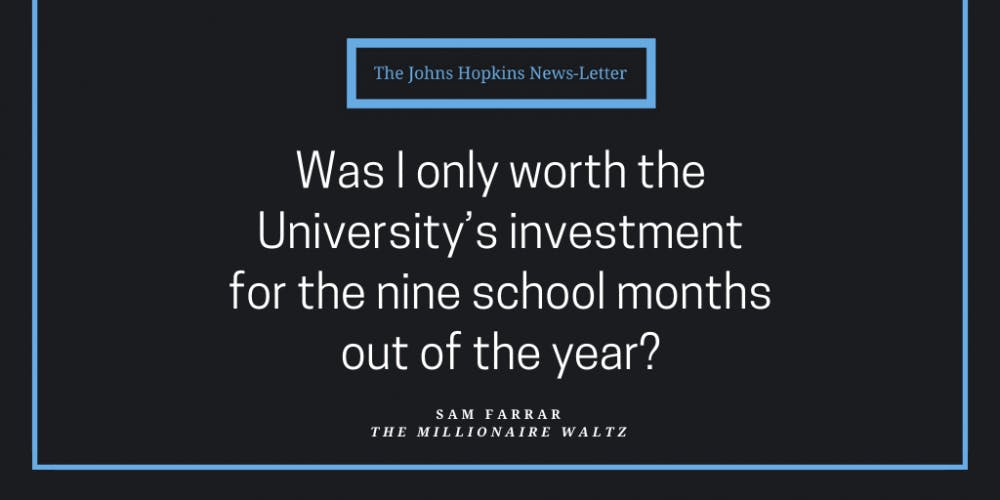
Moving off campus is expensive. Like, ridiculously expensive. For the first time in your life you have to start worrying about rent, renter’s insurance, electricity, internet and water. This is, of course, along with the one-time payments like security deposits or application fees. But that is only the start. Unless you go for a more expensive, furnished apartment or take over a room from a graduating friend, you have to buy an apartment’s worth of furniture.
That’s not just a bed, desk, chair, couch and so on; it includes kitchenware and cleaning supplies, like a broom and plunger; you have to buy all the cooking essentials that run out only once or twice a year all at once, like salt, baking soda or flour, magnifying that first grocery bill; and for those of us without cars, the simple transportation of stuff from your old dorm to your apartment or the travel between your many trips to the store can take on a cost all their own.
For all of these reasons, I lost a lot of money this summer. As in, all of it. Despite working a full time job, I lost my entire life savings in the moving process.
Don’t get me wrong — I wasn’t blowing my cash on Herman Miller furniture and health food store groceries. Almost all of the furniture my suite mate and I didn’t bring from home was purchased from the Hopkins “Free and For Sale” Facebook page. To this day, our dining table is a repurposed desk with a single folding lawn chair. Throughout the summer, the air conditioner in my room was set to a comfortable 85 degrees, so as to not drive up the electricity bill. I spent most of my dinners there, sweating over a hot bowl of 99-cent soup, bragging to my mom about how efficient I had been at the grocery store.
Now, I wasn’t perfect. In the first month, I definitely ate out a little more than I should have. I definitely could’ve gotten cheaper toilet paper and trash bags. But these are mistakes everyone makes, and as the summer went on, I started spending less and less. By the time the semester started, I had finally started making some of my money back.
During this whole process, I felt frustrated. I was frustrated that the same financial aid that protected me during the school year had turned a blind eye when I was at my most financially vulnerable. I was already doing my part; I worked 40 hours a week and saved money where I thought I reasonably could. Still, this summer — that I considered central to my college experience — was draining me of everything I had been able to save.
As soon as these thoughts entered my mind, I felt guilty. The University already gave me so much; effectively $70,000 a year. I already got so much — who was I to ask for more? Financial aid had only ever agreed to help me with expenses for school, and they had held up their side of the bargain. The University wasn’t responsible for me; I was responsible for myself. That’s part of being an adult.
Moreover, wasn’t it my fault I was in this situation to begin with? I could have gotten a cheaper apartment, even though my rent was decently below average for the area. I could have spent less money on food, even though six nights of the week I ate canned soup or store-brand pasta. Maybe if I hadn’t spent that $30 in May on some concert tickets for the fall, I would have been a little more comfortable with money then.
On the other hand, college is supposed to be an equalizing experience. Was I holding myself to a different standard from my peers in my frustration towards the lack of summer aid, or was the lack of a large savings account or middle-class parents holding me to a different standard from the start? If the summer was not a Hopkins educational experience, the University had no obligation to aid me. It is true that some of my peers spent time abroad with their family over the summer. Some had been part of a paid internship, more were in an unpaid position. Maybe since I had failed to get one of those competitive paid opportunities, I had no right to complain.
But then again, they had no obligation to aid me anyway. Some financial aid official saw something in me that made them think I was worth the investment to educate. Was I only worth the University’s investment for the nine school months out of the year?
I don’t have the answer to these questions. I know that is an unsatisfying conclusion, but ultimately, it is not up to me. This summer, I really had to come to terms with the fact that my time here at Hopkins is reliant on a process over which I have no control and no knowledge about how it functions. The fact that I dont have complete control over my ability to study at Hopkins just gives me all the more reason to be thankful that I’m here now.





